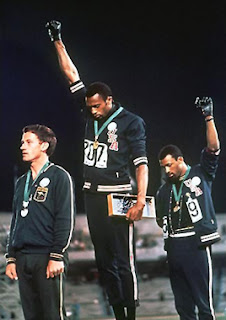Part Three: Black Power, Black
September, and Black Africa : the Olympics
during the Cold War
The second half of the twentieth century
witnessed a number of political conflicts which found themselves fought out
under the Olympic rings. The 1968 Games in Mexico City South Africa United
States and the Soviet Union
engaged in tit-for-tat boycotts of each other’s Games. On each of these
occasions, the response of the IOC was to reassert its apolitical character,
which meant in practice that it called for the suspension of all political and
social conflict which might interfere with the running of its showpiece event.
That
salute.
As with its dealing with the Nazis before
and during the 1936 Olympics, the IOC’s professed political apathy caused it to
sacrifice any moral compass in favour of bringing as many of the world’s
regimes under its banner as possible. Under Avery Brundage’s tenure as its
President, the organisation brought the Soviet Union and its satellites into
the Olympic fold despite their shameless flouting of the ban on
professionalism, tried to please both sides of the Beijing-Taiwan conflict over
Chinese sovereignty, and held off for as long as possible international
pressure to exclude the racially-selected sporting teams of South Africa and
Rhodesia. When the IOC voted in 1972, against the wishes of its President, to
bar Rhodesia
Although the Olympic movement during this
period operated in a world radically different from that which existed in the
first half of the twentieth century, many of the old sporting certainties
remained, and the world of Tom Brown’s
School Days was still the vision of sport adhered to by the keepers of the
Olympic flame. In the 1972 Winter Games at Sapporo

No comments:
Post a Comment